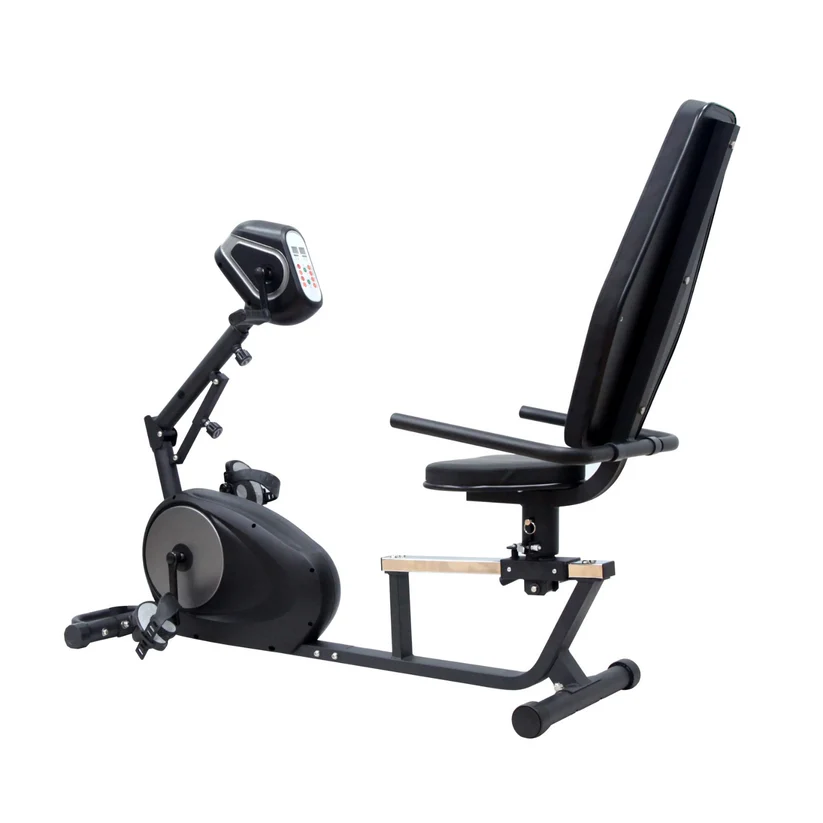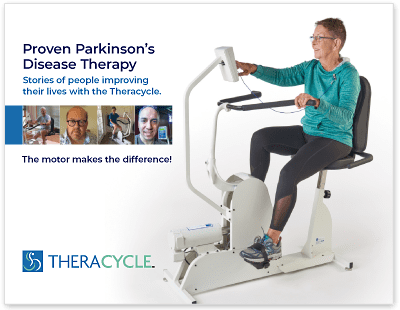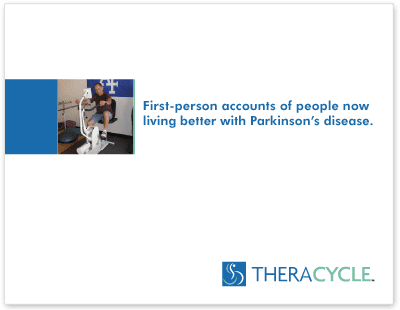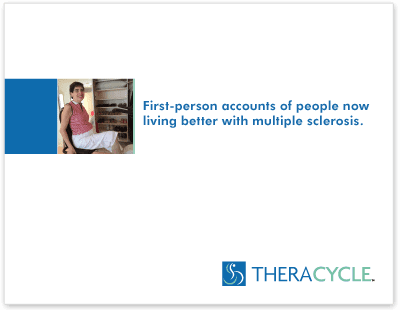- ›
- Conditions
- ›
- Theracycle & Multiple Sclerosis
- ›
- Multiple Sclerosis Treatment with MS Exercises
Exercises and MS
Medically reviewed by David Dansereau, MSPT
MS exercise therapy is said to be one of the most promising treatment approaches to rehabilitation for Multiple Sclerosis. MS exercise and overall MS physical therapy have been helping patients relieve MS symptoms at traditional physical therapy clinics for years.
A recent review of randomized controlled trials found exercise had a beneficial effect on MS patients, and a study from University of Illinois researchers found that any exercise helped limit cognitive difficulties associated with MS.
Existing research published by German researchers in the EPMA Journal made the point that exercise and physical therapy should be seen as part of the solution in a MS patient’s rehabilitation treatment plan.
Multiple studies have shown that MS exercise training can improve muscle strength for people who suffer from MS. Through the combination of progressive resistance training (PRT), aerobic exercise (AE), and other activities such as swimming and robotic-assisted treadmill training, patients with MS have been able to rehabilitate and make significant improvements in muscle strength.
Multiple Sclerosis Exercise
The Role of Exercise and Physical Activity in People with MS
For those who have MS, exercise and physical activity are one of the most important aspects of MS treatment. While many people with MS avoid exercise because they think it will aggravate their pain or make their fatigue worse, research has shown that exercise in fact has the opposite effect. Exercise and physical activity can significantly improve symptoms for those dealing with Multiple Sclerosis.
According to Diana Duda, PT, DPT, MSCS, Center Coordinator of Clinical Education at Rittenhouse and PAH Outpatient at Penn Medicine, regular, moderate physical exercise is good for the body, mind, and mood—and this is very true for patients with MS. When you have MS and you exercise regularly, it can improve your fitness and endurance, and the strength in your arms and legs.
Studies have shown that exercise for MS will also give you better control over your bowel and bladder function and decrease your overall fatigue. Regular exercise will also give your mood a boost.
Exercise and MS Symptoms: How Does Exercise Help MS Symptoms?
When looking at how exercise helps MS symptoms, we first must look at the increasing amount of research on how MS exercise training can improve aerobic and muscular fitness, fatigue, depression, walking, balance, cognition, and QQL for people with MS. Additional benefits, such as improved sleep quality and cardiovascular/metabolic comorbidity, can also be linked to MS exercise. Exercise for MS has been shown to reduce rates of MS relapses and decelerate disability progression.
When taking a step back in how exercise helps people dealing with Multiple Sclerosis, it has been proven that people with MS are significantly less physically active than someone who doesn’t have MS. Any time an individual experiences physical deconditioning due to low activity levels, this will result in fatigability and weakness.
Safe Exercise for Multiple Sclerosis
For those suffering from MS, safe exercise for Multiple Sclerosis is with a Theracycle. Multiple Sclerosis exercise can be achieved from the comfort of your own home using the Theracycle therapy bicycle as a supplement to MS physical therapy and exercise.
Theracycle offers unique semi-recumbent stationary therapy bikes that are designed specifically for individuals suffering from Multiple Sclerosis and other neurological disorders. Cycling with Theracycle’s MS exercise equipment helps MS patients with what is referred to as forced exercise—providing the needed assistance to pedal at a higher speed and longer duration than one can do on one’s own. A Theracycle provides MS patients with full-body motorized-assisted therapy proven to reduce symptoms and improve mobility and motor skills. While traditional exercise equipment requires a certain level of strength and endurance, Theracycle’s unique motor allows MS individuals to get the exercise they need, regardless of their strength and endurance levels on any given day.
Challenge: Rigidity and Fatigue from MS
Theracycle Solution: The Theracycle’s motor makes the difference. It provides an ideal complement to traditional MS rehabilitation therapy treatments. Using the Theracycle at home for Multiple Sclerosis exercise enables you to control the environment so you can avoid overheating.
The biggest challenge for many MS patients is finding the strength to fight the instinct to curl into the fetal position and pull the blanket over your head. As MS-certified physical therapist Diana Duda, PT, DPT, MSCS, explains, MS patients should see exercise as essential for their physical, mental, and emotional health.
Challenge: Limited Mobility due to MS
Theracycle Solution: Many traditional exercise bikes are difficult for MS patients with mobility challenges to mount and dismount. This creates safety and injury concerns, which only adds to the frustration of multiple sclerosis exercises.
Theracycle’s step-through design, ergonomically designed seat, and wheelchair-accessible models, along with its sturdy construction, give MS patients optimal stability. With a Theracycle, you can use the bike independently and feel secure doing so.
Challenge: Muscle Spasticity in patients with MS
Theracycle Solution: MS patients’ muscles stiffen, preventing normal blood flow; in turn, that causes the muscles to remain contracted, which affects patients’ ability to exercise. A 2006 comparative study published in Neuroscience Letters, however, found that a 20-minute cycling intervention resulted in “prolonged reductions in … MAS [modified Ashworth scale] scores compared with the control condition. This provides converging evidence for the anti-spastic potential of … cycling in individuals with MS.” The question for patients was, “How do we safely exercise with spasticity?”
A Theracycle allows MS patients to engage in assisted cycling rehabilitation therapy. The whisper-quiet ½ horsepower engine delivers all of the benefits of rigorous exercise even on days when your symptoms may otherwise prevent you from safely working out. This makes it ideal for patients experiencing spasticity.
In addition, Theracycle’s adaptive pedals provide a safe, comfortable, supportive and secure riding experience, helping MS patients who experience spasticity to safely and securely pedal the bike while avoiding potential injury if riding a more traditional bike. Theracycle’s adaptive pedal options include a sandal design pedal and a more advanced adaptive platform pedal that provide for safer and more effective exercise versus traditional bikes.
Challenge: Balance Issues for MS patients
Theracycle Solution: Every MS patient will have a different suite of symptoms and will experience those symptoms with varying severity. Balance issues are among the most common and can relate to many of the challenges described above—for instance, muscle spasticity might lead to issues with your gait, which might cause you to lose balance if you walk without a mobility aid.
For MS patients with more mild symptoms, specialized equipment might be as simple as attaching a side-view mirror to your handlebars, as MS patient and evangelist for the positive effects of cycling Christie Germans did soon after her diagnosis. If and as symptoms worsen, MS patients can pursue rehabilitation options such as recumbent bikes and handcycles. Patients can decide at any point to supplement (or replace) their existing road cycle with an in-home motorized Theracycle that allows for safe assisted exercise regardless of the weather OR the severity of their symptoms.
Theracycle is the in-home Multiple Sclerosis therapy solution for Multiple Sclerosis exercises and supplemental MS physical therapy treatment. Our Multiple Sclerosis customers love their Theracycle. See what our customers say.
User Testimonials
The Theracycle helps me to move my legs every day. This exercise has lessened my circulation problems, loosened the stiffness in my thighs and calves, and reduced painful leg spasms.” Mary Smith
South Windsor, CT
Patients who have used the Theracycle have shown increased range of motion and decreased spasticity, improved muscle tone, strength and balance control. Further, use of the Theracycle has increased the physical endurance and improved the psychological outlook of these patients.” Dr. Thomas F. Morgan
Assistant Professor of Clinical Neuroscience
Brown University School of Medicine
Theracycle has been great for me. I used to be very athletic. I was a 5K runner, and a downhill and cross-country skier. My MS has stopped me from doing these things. After sitting in a wheelchair all day, Theracycle helps unstiffen my legs and reduce the swelling in my ankles. By using the Theracycle, I get that same feeling back in my legs I once felt by running and skiing. Also, it helps keep my blood pressure down. This machine has already given me more of a workout than I have had literally in years!” Mark Mathews
New Mexico
Read more testimonials from Theracycle users with Multiple Sclerosis »
The benefits of Multiple Sclerosis exercise as supplemental to traditional MS rehabilitation treatment and physical therapy can be achieved in the privacy of your own home with a Theracycle. Theracycle is the best in-home solution for MS exercises and supplemental MS physical therapy treatment.
Are you ready to improve the quality of your own life? Call us today!
Call us: 1.800.367.6712
Additional Information on MS










